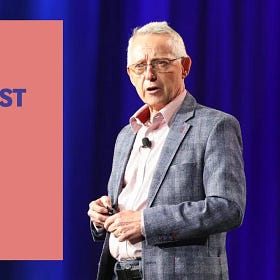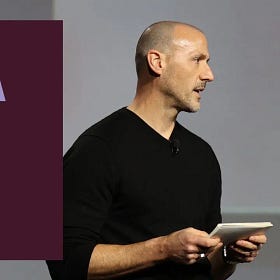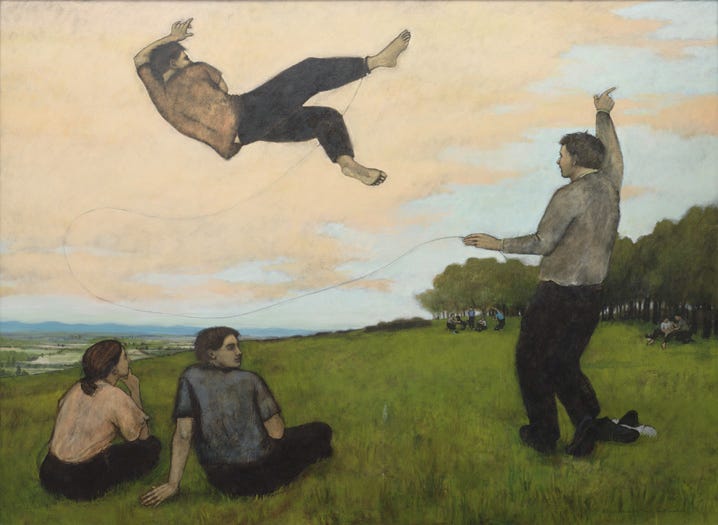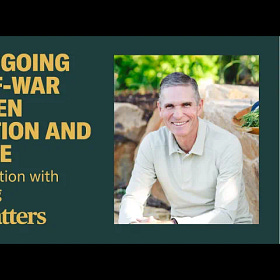How can we find safety, peace, and holiness?
Faith Matters resources to accompany your Come Follow Me study: May 5-11
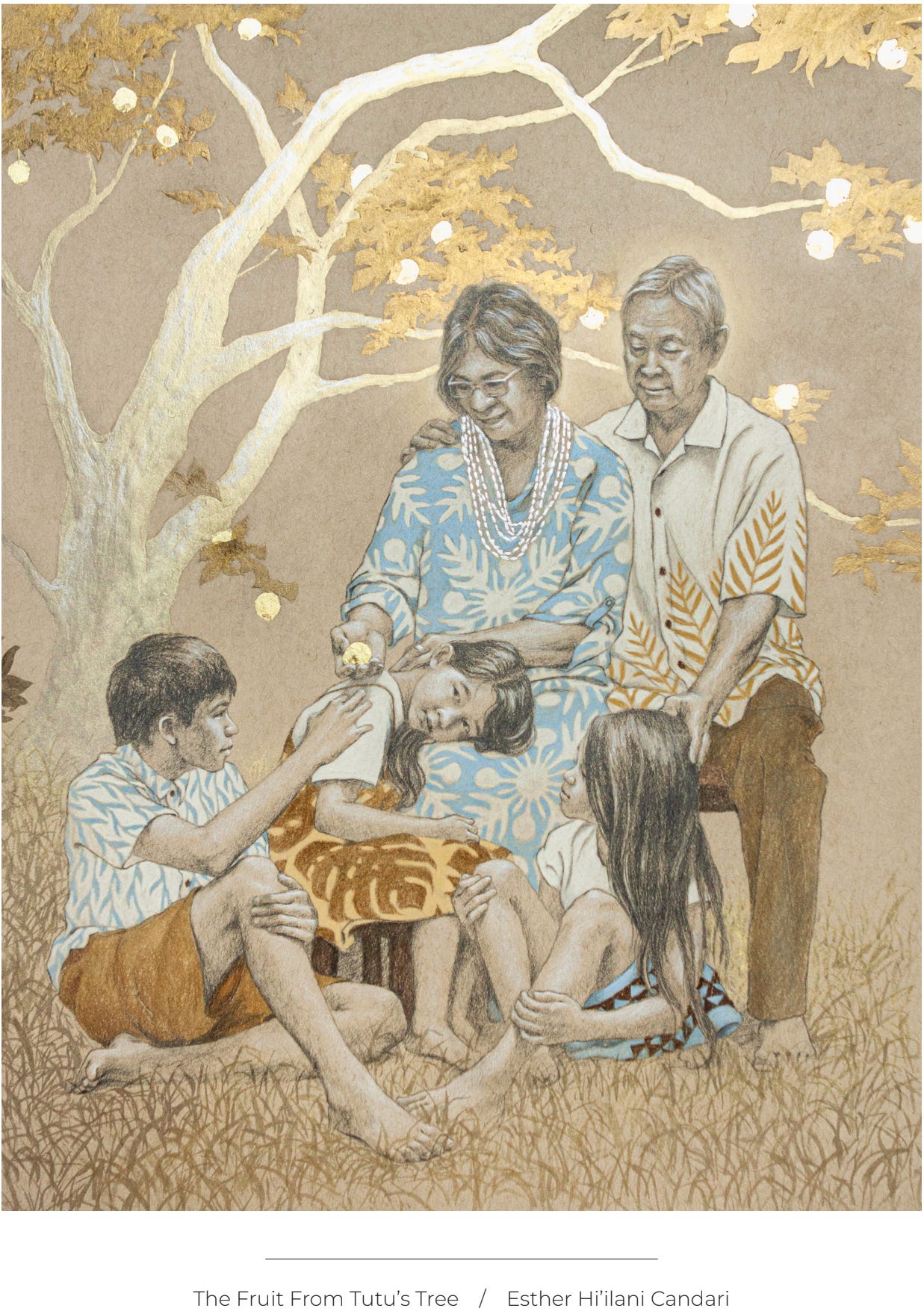
Jesus Christ is my Advocate with the Father.
Terryl Givens: Peaceable Things: Three Names of Christ
Creator, Emmanuel, Paraclete: taking us on a journey through the scriptures and Early Church theologians, Terryl Givens opens a wealth of insight into the significance of these three names of Christ and what they mean for our faith today.
Christ will be our witness. not in a tribunal or in a court where we need defending, but in a setting in which he wants to celebrate those efforts that we have made to be his disciples and to witness of him. And that's why the third term that I use is the term paraclete, because I don't think advocate captures it and I don't think comforter captures it.
The etymology of paraclete is “one who proclaims along the side of.” And I think Christ is telling us that among his other callings and roles and missions, he came to this world and was incarnate so that he could bear witness of what we experience, what we suffer, and how we struggle to honor him.
I think that gives us a different way to think about judgment, and I think it's in line with what Elder Uchtdorf has taught about judgment. That the “day of judgment will be a day of mercy and love, a day when broken hearts are healed, when tears of grief are replaced with tears of gratitude, when all will be made right.”
If that's the case, then the scene of judgment, it seems to me, has to be something very different from that which so many of us imagine.
—Terryl Givens
Adam Miller : Love is a Law, Not a Reward
There is no commandment in any scripture delivered from any pulpit by any prophet in any age to make myself into someone that God could finally love. There is no commandment to make myself perfectly lovable. It is impossible to keep this commandment, this imaginary commandment to be perfectly lovable, because God never gave it. And for this same reason, it's impossible to break this commandment. It's impossible to break a commandment that God never gave. There is instead, as Steve Young reminds us, always and only the single, eternal, unconditional commandment to do love's work. To love God with all my heart and then to join God in the hard work of loving others.
Justin Dyer: Be ye Therefore a Perfectionist?
Listen to Justin Dyer share some gospel principles that could help us replace unhealthy perfectionistic beliefs. Justin offers practical, hopeful steps for healing from perfectionism, embracing a view of self-worth firmly rooted in God’s infinite love. He also shares a vision for how we can help our wards to become a place of healing and welcoming where everyone can feel like they belong.
The gospel is a standard to the nations. The gospel of Jesus Christ is a standard to the world.
In the first decade and a half of the Church’s life, we sought to save the world by gathering converts to Zion. During those years, we concentrated the gathered membership in single cities. Independence, Far West, and Nauvoo took turns being Zion—the safe havens in the coming apocalypse. After the move west, new converts gathered to a new Zion: a region of Great Basin villages, more or less patterned after the original plat for the City of Zion in Missouri. In the twentieth century, gathering took still another form as saints planted “stakes” throughout the world and gathered locally to build mini-Zions. Stakes were established first in Denver and the great western coastal cities—Los Angeles, San Francisco, Portland, and Seattle—and then by the 1940s in New York and Washington D.C. We were to save the world by gathering people into these stakes, which theoretically could be planted anywhere. Today, there are Latter-day Saint outposts in virtually every part of the world where the law permits. Gathering now is not only to the cities of the midwest or Great Basin villages, but likewise to stakes in Indonesia and Africa and across the world.
In all of this expansion, we are left with a pressing question: what of those who do not obviously want to be “gathered?” Missionary efforts go on apace—we continue inviting the world’s citizens to gather into worldwide stakes by joining themselves formally to the Church. But what about the vast majority of the world’s population—those who either never hear the call to gather or who hear but, for any of a thousand reasons, never heed it? What is our responsibility toward the billions of our brothers and sisters who do not heed our message? I believe that we are beginning to understand that we have a responsibility to better the world for all of its citizens, whether they choose to be gathered or not.
—Richard Bushman, “How to Save the World”
Jesus Christ will return in glory.
I think that when God said, “If ye are prepared, ye shall not fear,” He was speaking less about seventy-two-hour kits and three-month supplies and more about being, as these people Alma found to teach, “in a preparation” to do or accept whatever it is the situation calls for at the moment. That is, to be humble, grounded, flexible, and open. To live our lives in such a way that when we are faced with difficulty, destruction, and even despair, we will be able to discern the best course of action step by step, led by faith.
—Lizzie Heiselt, “If Ye Are Prepared”
Early Christians believed the return of Christ was imminent. When his return seemed delayed, Paul reassured them that Jesus would return soon, that the righteous would be lifted up, and that the dead would be raised to meet him. As the years continued to pass, Christians developed different interpretations about when Jesus would return and what that return would look like. Here we discuss the chapter, “Facing the End: The Second Coming of Jesus Christ and the Millennium” in Ancient Christians: An Introduction for Latter-day Saints:
I can “stand in holy places” and not be moved.
As revelation began to flow, the earth under Joseph’s feet became holy ground in widening circles of sacred geography. The remnant of the house of Israel? They’re here, just down the river. New Jerusalem, site of the second coming? Watch this space, coming soon. The garden of Eden, primordial belly button of the world? It’s here too, in Missouri. Eve ate the apple on the same Ozark highland where my robin ate the inchworm.
If you find a touch of the absurd in this, I agree. We’re accustomed to thinking of the sacred as something apart, exalted. And we have good reason: the roots of the word sacred contain the idea of something protected and removed from ordinary settings, everyday experience. Sacred space is an ancient land, a walled garden, or the top of a mountain, the higher the better. But the restoration introduced a low-elevation version of sacred geography. Right here, at ground level, among normal places and events, sacred things happened. …
As the Restoration unfolded, these geographic circles extended outward with no apparent limit. A general principle came into view, a kind of axiom of the Restoration: the whole world is holy, because it is where we encounter God. In time, Joseph understood that these sacred circles, always widening underfoot, were both geographic and metaphysical. The spirit world? Look around, it’s here. Heaven? Also here, wherever you are. Eternal life? The people and relationships closest to you.
—Rosalynde Welch, “Airborne at Low Elevation”
Zion is a place of safety for the Saints of God.
Zion is not just a location on a map, but a way of relating to each other and to God: “And the Lord called his people Zion, because they were of one heart and one mind, and dwelt in righteousness; and there was no poor among them.”(Moses 7:18) Mary’s last words expressed a longing for both that place where she could be reunited with family and for membership in a “beloved community.” Who among us does not aspire, as Mary did, to live always with our “face toward Zion,” especially as we observe the turmoil, polarization, and contention in our present-day communities? In an age of rampant political conflict, continuing racial tensions, and a social media culture driven by algorithms designed to close our minds, where does one find community? More importantly, how can we build a community worthy of the name Zion? We, too, look toward Zion and yearn for a time when we as a people can “have our hearts be knit together in unity and in love towards one another.”(Mosiah 18:21) We suggest three guiding principles or practices from our field of psychology that can lead us toward Zion: proximity, empathic listening, and humility. As we focus our minds and hearts on the people of Zion, Zion becomes a way of being.
—Ben Ogles & M. Esperanza Dotto, “Facing Zion”
The idea of “Zion” is not unique to The Church of Jesus Christ of Latter-day Saints, but the Book of Mormon and modern revelation sharpen our image of what it can, and should, be. Zion is not just the millennial community that greets the Savior upon His return and lives with him in peace for a millennium. Zion should come now. Zion is a physical place and a figurative community. Zion is a place of diversity and peace. In Zion, we have everlasting joy.
The final prophet of the Book of Mormon, Moroni, pleads with future generations to build Zion: “Put on thy beautiful garments, O daughter of Zion; and strengthen thy stakes and enlarge thy borders(.)” Similar exhortations are made by Isaiah of the Old Testament, as well as in the Doctrine and Covenants. The pairing is uniform in all three instances: strengthen your stakes, and enlarge your borders. Strengthening Zion can’t come without enlarging Zion. Prosperity isn’t possible without inclusion.
—Samuel Benson, “A Zion for All of Us”
Jeff Strong: The Ongoing Tug-of-War Between Tradition and Change
One of the tensions we discussed with Jeff is, what is the purpose of the Church? Is the Church a bomb shelter, or is the Church a school? Is the Church about sanctuary, fleeing the world? Or is the Church about transcendence? "Sometimes in the Church we have a bomb shelter mentality, and yet the gospel teaches that the gospel is about transcendence, becoming a new creature in Christ, experiencing a mighty change, awakening unto God, overcoming the natural man... that doesn't feel like bomb shelter to me, but yet sometimes we feel the need to have sanctuary and peace and refuge from the world, and so there's tension there."




